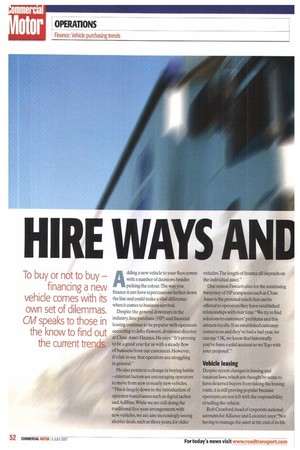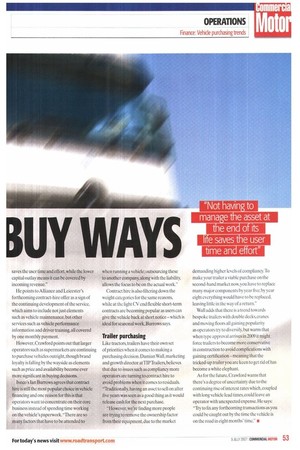HIRE WAYS AN 13111' WAYS
Page 56

Page 57

If you've noticed an error in this article please click here to report it so we can fix it.
Adding a new vehicle to your fleet comes with a number of decisions besides picking the colour.The way you finance it can have repercussions further down the line and could make a vital difference when it comes to business survival.
Despite the general downturn in the industry, hire purchase (HP) and financial leasing continue to be popular with operators according to John Fawcett, divisional director at Close Asset Finance. He says: "It's proving to be a good year for us with a steady flow of business from our customers. However, it's fair to say that operators are struggling in general."
He also points to a change in buying habits — external factors are encouraging operators to move from new to nearly new vehicles. "This is largely down to the introduction of operator-based issues such as digital tachos and AdBlue.While we are still doing the traditional five-year arrangements with new vehicles, we are also increasingly seeing shorter deals, such as three years, for older vehicles.The length of finance all depends on the individual asset."
One reason Fawcett cites for the continuing buoyancy of HP companies such as Close Asset is the personal touch that can be offered to operators they have established relationships with over time. "We try to find solutions to customers' problems and this attracts loyalty If an established customer comes to us and they've had a had year, we can say, OK, we know that historically you've been a solid account so we'll go with your proposal'."
Vehicle leasing
Despite recent changes in leasing and taxation laws, which are thought by some to have deterred buyers from taking the leasing route, it is still proving popular because operators are not left with the responsibility of selling the vehicle.
Rob Crawford, head of corporate national accounts for Alliance and Leicester. says: "Not having to manage the asset at the end of its life saves the user time and effort, while the lower capital outlay means it can he covered by incoming revenue."
He points to Alliance and Leicester's forthcoming contract-hire offer as a sign of the continuing development of the service, which aims to include not just elements such as vehicle maintenance, but other services such as vehicle performance information and driver training, all covered by one monthly payment.
However, Crawford points out that larger operators such as supermarkets are continuing to purchase vehicles outright, though brand loyalty is falling by the wayside as elements such as price and availability become ever more significant in buying decisions.
Iveco's Ian Burrows agrees that contract hire is still the most popular choice in vehicle financing and one reason for this is that operators want to concentrate on their core business instead of spending time working on the vehicle's paperwork."There are so many factors that have to be attended to when running a vehicle; outsourcing these to another company, along with the liability, allows the focus to he on the actual work."
Contract hire is also filtering down the weight categories for the same reasons, while at the light CV end flexible short-term contracts are becoming popular as users can give the vehicle hack at short notice— which is ideal for seasonal work, Burrows says.
Trailer purchasing
Like tractors, trailers have their own set of priorities when it comes to making a purchasing decision. Damian Wall, marketing and growth director atTIPTrailers,believes that due to issues such as compliancy more operators are turning to contract hire to avoid problems when it comes to residuals. "Traditionally, having an asset to sell on after five years was seen as a good thing as it would release cash for the next purchase.
"However, we're finding more people are trying to remove the ownership factor from their equipment, due to the market demanding higher levels of compliancy. To make your trailer a viable purchase on the second-hand market now, you have to replace many major components by year five; by year eight everything would have to be replaced, leaving little in the way of a return."
Wall adds that there is a trend towards bespoke trailers with double decks, cranes and moving floors all gaining popularity as operators try to diversify, but warns that when type approval arrives in 2009 it might force trailers to become more conservative in construction to avoid complications with gaining certification—meaning that the tricked-up trailer you are keen to get rid of has become a white elephant.
As for the future, Crawford warns that there's a degree of uncertainty due to the continuing rise of interest rates which, coupled with long vehicle lead times, could leave an operator with unexpected expense. He says: "Try to fix any forthcoming transactions as you could be caught out by the time the vehicle is on the road in eight months' time." •






























































































































































































